上海牛津英语5B知识点汇总
上海牛津英语5B复习

5B 知识点梳理 Module3
Unit 1 了解几种常见标志的英文表达及其在日常
生活中的应用。 掌握情态动词 can ,must, should 的用法:
You can’t ride your bicycle here. It means we mustn’t swim. 掌握句型: You can’t ….
Let’s review
.
5B 知识点梳理 Module1
Unit1了解并掌握学习用品类的单词。 掌握人称代词的不同形式,并根据句子的意思,正确使用人称
代词。 掌握Whose … is this/that? Whose …are these/ those? 的句
型,以及他们的回答。 4) Whose school bag is this? It’s __________.(mine, ours, his, hers, ours, theirs)
Right.正确! What els. e?还有呢?
5B 知识点梳理 Module4
Unit 1 了解各种博物馆的英文表达。 掌握句型:Which museum do you want …? Why?
Because … What did you see there?
Unit 2 了解西方节日,它们都在什么时候,有什么风俗习惯。
What is the temperature? What was the temperature?
.
Module3
Unit 3
了解并掌握有关家具类的单词。 掌握方位介词: under, next to, behind,
on …. 掌握句型: Let’s … Are there any
changes …? The sofa was… Now it’s …. 4) 了解上海的变化。 Sounds fun.听起来很有趣。 Yes, let’s do that.好的,我们就那样做吧。 You’re right.你说对了。
牛津小学英语5B_期末复习资料
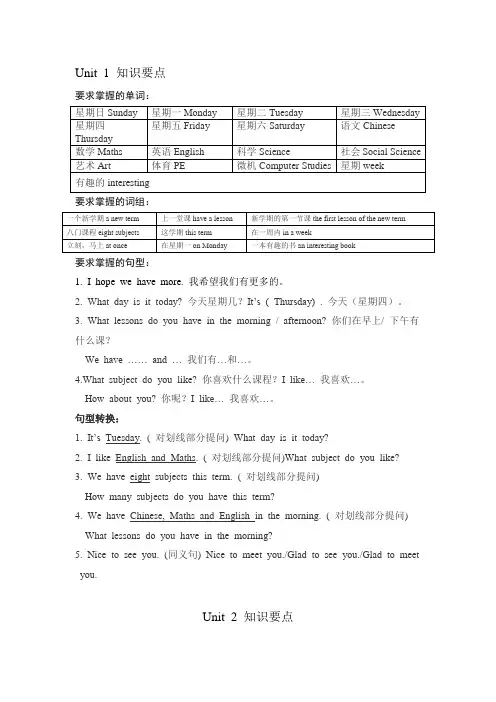
Unit 1 知识要点要求掌握的单词:要求掌握的词组:要求掌握的句型:1. I hope we have more. 我希望我们有更多的。
2. What day is it today? 今天星期几?It’s ( Thursday) . 今天(星期四)。
3. What lessons do you have in the morning / afternoon? 你们在早上/ 下午有什么课?We have …… and …我们有…和…。
4.What subject do you like? 你喜欢什么课程?I like…我喜欢…。
How about you? 你呢?I like…我喜欢…。
句型转换:1. It’s Tuesday. ( 对划线部分提问) What day is it today?2. I like English and Maths. ( 对划线部分提问)What subject do you like?3. We have eight subjects this term. ( 对划线部分提问)How many subjects do you have this term?4. We have Chinese, Maths and English in the morning. ( 对划线部分提问) What lessons do you have in the morning?5. Nice to see you. (同义句) Nice to meet you./Glad to see you./Glad to meet you.Unit 2 知识要点要求掌握的单词:要求掌握的词组:要求掌握的句型:1. Why are you absent today?你今天为什么缺席?(相当于Why are you not here today?)2. See you soon. 一会见。
上海版牛津英语5b 知识点整理、默写纸
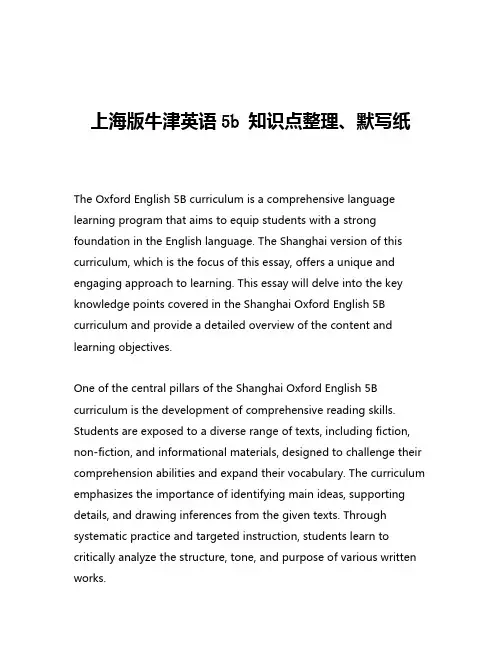
上海版牛津英语5b 知识点整理、默写纸The Oxford English 5B curriculum is a comprehensive language learning program that aims to equip students with a strong foundation in the English language. The Shanghai version of this curriculum, which is the focus of this essay, offers a unique and engaging approach to learning. This essay will delve into the key knowledge points covered in the Shanghai Oxford English 5B curriculum and provide a detailed overview of the content and learning objectives.One of the central pillars of the Shanghai Oxford English 5B curriculum is the development of comprehensive reading skills. Students are exposed to a diverse range of texts, including fiction, non-fiction, and informational materials, designed to challenge their comprehension abilities and expand their vocabulary. The curriculum emphasizes the importance of identifying main ideas, supporting details, and drawing inferences from the given texts. Through systematic practice and targeted instruction, students learn to critically analyze the structure, tone, and purpose of various written works.In addition to reading comprehension, the Shanghai Oxford English 5B curriculum places a strong emphasis on written expression. Students are guided through the process of writing, from brainstorming and outlining to drafting, revising, and editing. The curriculum covers a wide range of writing genres, including personal narratives, descriptive essays, persuasive pieces, and research-based reports. Students learn to organize their thoughts effectively, use appropriate language and tone, and develop their writing skills to communicate their ideas clearly and coherently.Vocabulary development is another key focus of the Shanghai Oxford English 5B curriculum. Students are introduced to a rich tapestry of words, including academic and subject-specific terminology, as well as common idiomatic expressions and colloquialisms. The curriculum employs various strategies to help students acquire and retain new vocabulary, such as context-based learning, word roots and affixes, and strategic memorization techniques. By mastering a diverse vocabulary, students are better equipped to comprehend complex texts, engage in sophisticated discussions, and express themselves with precision and nuance.The Shanghai Oxford English 5B curriculum also places a strong emphasis on the development of grammar and language mechanics. Students learn to recognize and apply the fundamental rules ofEnglish grammar, including sentence structure, parts of speech, verb tenses, and subject-verb agreement. They also develop an understanding of punctuation, capitalization, and other conventions of written English. Through targeted practice and feedback, students are able to apply their grammatical knowledge to improve the clarity and correctness of their written and spoken communication.Alongside the academic focus, the Shanghai Oxford English 5B curriculum also addresses the importance of developing critical thinking and problem-solving skills. Students are encouraged to engage in analytical discussions, evaluate multiple perspectives, and draw logical conclusions based on evidence. The curriculum incorporates activities and tasks that challenge students to think critically, reason effectively, and apply their knowledge to real-world scenarios.The Shanghai Oxford English 5B curriculum also places a strong emphasis on the development of language proficiency through the integration of listening, speaking, and presentation skills. Students are exposed to a variety of audio and video materials, ranging from authentic conversations to academic lectures, and are trained to comprehend and analyze the content. Additionally, the curriculum provides ample opportunities for students to engage in meaningful discussions, deliver oral presentations, and participate in collaborative activities, fostering their ability to communicateeffectively in English.To reinforce the learning process and assess student progress, the Shanghai Oxford English 5B curriculum includes a comprehensive system of formative and summative assessments. Regular quizzes, tests, and projects allow students to demonstrate their understanding of the material and receive constructive feedback. The curriculum also incorporates opportunities for self-reflection and peer evaluation, enabling students to take an active role in monitoring their own learning and development.In conclusion, the Shanghai Oxford English 5B curriculum is a robust and well-designed program that aims to cultivate a strong foundation in English language proficiency. By focusing on reading comprehension, written expression, vocabulary development, grammar, critical thinking, and language skills, the curriculum provides students with the necessary tools to excel in their academic pursuits and engage effectively in the global community. The comprehensive nature of the program, coupled with its emphasis on active learning and assessment, makes it a valuable resource for students seeking to enhance their English language skills and achieve academic success.。
牛津小学英语5b知识点和重点短语句型
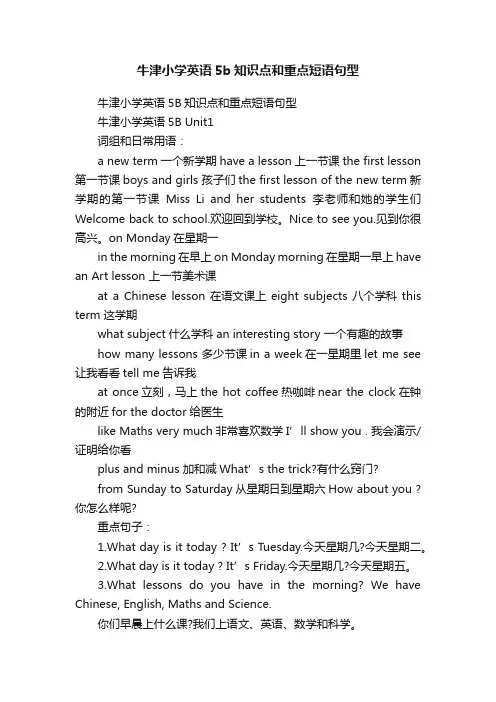
牛津小学英语5b知识点和重点短语句型牛津小学英语5B知识点和重点短语句型牛津小学英语5B Unit1词组和日常用语:a new term一个新学期have a lesson上一节课the first lesson 第一节课boys and girls 孩子们the first lesson of the new term新学期的第一节课Miss Li and her students李老师和她的学生们Welcome back to school.欢迎回到学校。
Nice to see you.见到你很高兴。
on Monday在星期一in the morning在早上on Monday morning在星期一早上have an Art lesson 上一节美术课at a Chinese lesson在语文课上eight subjects八个学科this term 这学期what subject什么学科an interesting story 一个有趣的故事how many lessons 多少节课in a week在一星期里let me see 让我看看tell me告诉我at once立刻,马上the hot coffee热咖啡near the clock在钟的附近for the doctor给医生like Maths very much非常喜欢数学I’ll show you . 我会演示/证明给你看plus and minus 加和减What’s the trick?有什么窍门?from Sunday to Saturday从星期日到星期六How about you ? 你怎么样呢?重点句子:1.What day is it today ? It’s Tuesday.今天星期几?今天星期二。
2.What day is it today ? It’s Friday.今天星期几?今天星期五。
3.What lessons do you have in the morning? We have Chinese, English, Maths and Science.你们早晨上什么课?我们上语文、英语、数学和科学。
沪教版小学牛津英语5b英语知识点梳理(含听力材料)
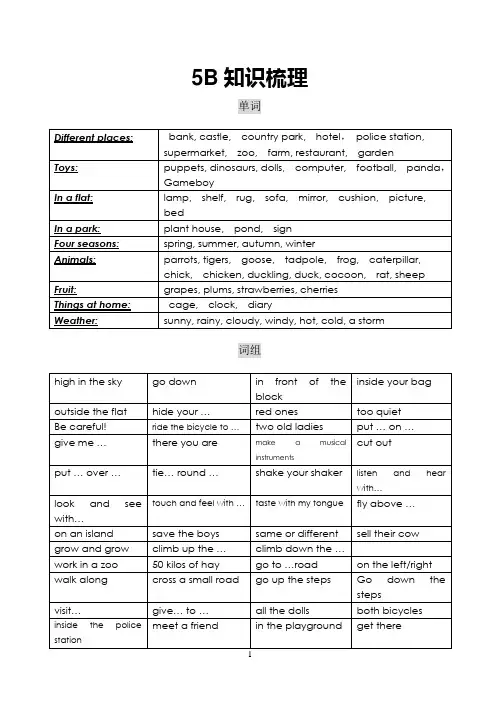
5B知识梳理单词词组主要句型和语法点1.介词:behind, beside, inside, on的用法2.to be 句型:肯定句,否定句,一般疑问句,特殊疑问句及其它们的回答1)Where is it /are they?2)Is it…?3)Whose …is this/are these?4)What time…?5)Whose are/is …?6)What colour …?7)Where’s it now?3.can的句型:肯定句,否定句,一般疑问句,特殊疑问句及其它们的回答1)Can you see? – Yes, I can. No, I can’t.2)What can…?3)…can’t….4.祈使句:8)Be careful/quiet!9)Draw …10)Put …5.形容词1)soft, fluffy, shiny, warm,2)new, small, big, loud, quiet,3)same, different,4)colours5)Seasons6)wet, sunny, cloudy, dry6.连词:and7.名词性的物主代词的用法:mine, yours, his, hers, theirs, ours,8.时间表达法:1)at … o’clock2)in the morning/afternoon3)five past/to one4)nine fifteen/ a quarter past nine9.指示和问路:How can I get to…/How can I get there?10.to do 句型:肯定句,否定句,一般疑问句,特殊疑问句及其它们的回答1)Do you want…?2)Which … do you like?11.have got句型:1)What have you got?2)Who has got…?12.both, all的用法both 两者都,all三者以上,后面所跟名词必须是复数,both rulersall the rulers13.一般过去时: 肯定句,否定句,一般疑问句,特殊疑问句及其它们的回答1)Where was Sam?He was….He wasn’t…Was he….? No, he wasn’t. Yes, he was.2)There was a cat.3)He cut the rice last year.He didn’t cut the rice….Did he cut the rice…..?Yes, he did. No, he didn’t.What did he cut last year?日常会话1.Sorry!2.Excuse me! Ok! You are welcome! Yes, it is. No, it isn’t3.Hello!4.I don’t know. Thank you very much!5.Good night!6.What time is it?。
牛津小学英语5B知识点(全)
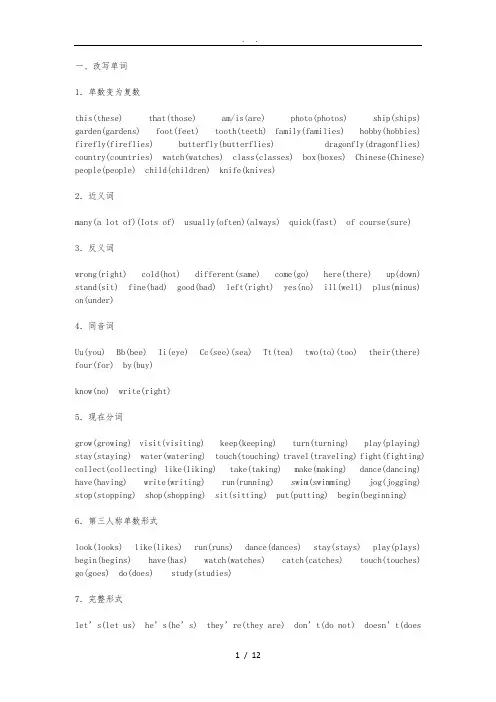
一、改写单词1.单数变为复数this(these) that(those) am/is(are) photo(photos) ship(ships) garden(gardens) foot(feet) tooth(teeth) family(families) hobby(hobbies) firefly(fireflies) butterfly(butterflies) dragonfly(dragonflies) country(countries) watch(watches) class(classes) box(boxes) Chinese(Chinese) people(people) child(children) knife(knives)2.近义词many(a lot of)(lots of) usually(often)(always) quick(fast) of course(sure)3.反义词wrong(right) cold(hot) different(same) come(go) here(there) up(down) stand(sit) fine(bad) good(bad) left(right) yes(no) ill(well) plus(minus) on(under)4.同音词Uu(you) Bb(bee) Ii(eye) Cc(see)(sea) Tt(tea) two(to)(too) their(there) four(for) by(buy)know(no) write(right)5.现在分词grow(growing) visit(visiting) keep(keeping) turn(turning) play(playing) stay(staying) water(watering) touch(touching) travel(traveling) fight(fighting) collect(collecting) like(liking) take(taking) make(making) dance(dancing) have(having) write(writing) run(running) swim(swimming) jog(jogging) stop(stopping) shop(shopping) sit(sitting) put(putting) begin(beginning)6.第三人称单数形式look(looks) like(likes) run(runs) dance(dances) stay(stays) play(plays) begin(begins) have(has) watch(watches) catch(catches) touch(touches) go(goes) do(does) study(studies)7.完整形式let’s(let us) he’s(he’s) they’re(they are) don’t(do not) doesn’t(doesnot) I’ve(I have) can’t(can not)8.名词所有格Ben(Ben’s)Mike(Mike’s) Su Yang(Su Yang’s) Helen(Helen’s)9.主格his(he) her(she) me(I) them(they) your(you) us(we)10.宾格she(her) he(him) I(me) you(you) they(them) we(us) it(it)二、改写句子1.对画线部分提问It’s half past ten. (What time is it?)The students are in the sprots hall. (Where are the students?)My uncle likes growing flowers. (What does your uncle like doing?)I feel better now. (How do you feel now?)I’ve got a high fever. (What’s wrong with you?)I come from Japan. (Where do you come from?)She is from China. (Where is she from?)The girl in red is my sister. (Which girl is your sister?)Tom comes from the USA.(Who comes from the USA?)2.改为一般疑问句I’m taking some medicine. (Are you taking any medicine?)She feels very tired. (Does she feel tired?)I want to fly a kite. (Do you want to fly a kite?)The boy is standing. (Is the boy standing?)He lives in a small town. (Does he live in a small town?)They can play the piano. (Can they play the piano?)3.改为否定句My mother is taking some medicine. (My mother isn’t taking any medicine.) She can mak e clothes. (She can’t make clothes.)He works from Monday to Friday. (He doesn’t work from Monday to Friday.) They’re buying food in the shop. (they aren’t buying food in the shop.) They play table tennis every day. (They don’t play table tennis every d ay.) That is Jan’s umbrella. (改为同义句)That umbrella is Jan’s.It’s time to have breakfast. (改为同义句)It’s time for breakfast./It’s time for having breakfast.Who is absent today? (改为同义句)Who is not here today?I’m going to the library now. (改为祈使句)Don’t go to the library now.The man puts the plate on his finger. (改为现在进行时)The man is putting the plate on his finger.They are our good friends. (改为单数形式)He is my good friend.They usually do housework on Sundays. (改为单数形式)He usually does housework on Sunday.三、连词成句think, is, today, Saturday, I (.) (I think today is Saturday.) you, can, me, tell (?) (Can you tell me?)I, to, go, China, hope, I, can (.) (I hope I can go to China.) this, subject, you, do, what, like, term (?)(What subject do you like this term?)lesson, it, the, new, the, of, term, is first (.)(It is the first lesson of the new term.)is, stamps, he, showing, to, friends, his, his (.)(He is showing his stamps to his friends.)she, does, making, like, ships, model (?)(Does she like making model ships?)with, what’s, you, wrong (?) (What’s wrong with you?)have, lessons, I, in, four, the, morning (.)(I have four lessons in the morning.)goes, from, he, Friday, to, Monday, school, to (.)(He goes to school from Monday to Friday.)subjects, study, what, he, at, does, school (?)(What subjects do you study at school?)hobby, stamps, is, Ben’s, collecting (.)(Ben’s hobby is collecting stamps.)you, in, what, do, lessons, the have, morning (?)(What lessons do you have in the morning?)you, why, absent, are, today (?) (Why are you absent today?) left, right, Ton, three, turn, times, and (.)(Turn left and right three times, Tom.)you, touch, your, your, head, can, with, hands(?)(Can you touch your head with your hands?)lie, do, on, not, your, back(.)(Do not lie on your back.) putting, the, is man, on, the, apple, finger, his (.)(The man is putting the apple on his finger.)are, the, lesson, students, where, having, a PE (?)(Where are the students having a PE lesson?)fingers, many, does, how, the, have, monkey (?)(How many fingers does the monkey have?)has, a, David, day, busy (.) (David has a busy day.)a, game, basketball, this, there, evening, is (.)(There is a basketball game this evening.)what, it, is, time, now, Ben(?) (What time is it now,Ben?) you, thirsty, feel, do (?) (Do you feel thirsty?)begins, English, at, to, fifteen, our, lesson, ten (.)(Our English lesson begins at fifteen to ten.)like, Mike, does, to, English, speak (?)(Does Mike like to speak English?)same, Tom, are, Jason, From, country, the and (.) (Tom and Jason are from the same country.)are, the, Miss, talking, Wang, students, to (.) (The students are talking to Miss Wang.)want, do, New York, you, go, to, around (?)(Do you want to go around New York?)teaches, he, in, school, English, a, primary (.) (He teaches English in a primary school.)it, today, what, is day(?) (What day is it today?) is, think, interesting, I, English (.)(I think English is very interesting.)us, meet, come, and, here(.)(Come here and meet us.) an, , he, writing, is, his, teacher, to (.)(He is writing an to his teacher.)四、中译英(一)词组1 在周一上午(on Monday morning)2读英语(read English)3上一节美术课(have an Art lesson)4一节有趣的课(an interesting lesson)5上更多的课(have more lesson)6每天(every day)7马上(at once)8午饭后(after lunch)9感到很热(feel hot)10重感冒(a bad cold)11.休息(have a rest)12看医生(see a doctor)13吃一些药(take some medicine)14感到好些了(feel better)15在周三(on Wednesday)16星期四下午(Thursday afternoon)17七门科目(seven subjects)18在一周(in a week)19对…说话(speak to…)20打给我(call me)21患了咳嗽(get a cough)22怎么了(what’s wrong)23在学校(at school)24呆在床上(stay in bed )25错误(wrong number )26拍照(take photos )27集邮(collect stamps)28一位老同学(an old classmate)29一艘轮船(a ship )30购物(go shopping)31种树(grow the trees)32听音乐(listen to music)33出示…给…(show to… )34看一看(have a look)35养金鱼(keep goldfish)36一封(an )37同龄(the same age)38在一个小镇上(in a small town)39一封给我姐姐的信(a letter to my sister) 40居住(live in)41小房子(a small house)42从…到…(from…to…)43安静地坐(sit quietly)44在我家附近(near my home)45做衣服(make clothes)46上学(go to school)47放学后(after school)48做运动(do sports)49一动物邮票(an animal stamp)50拍照(take photos)51养狗(keep dogs)52相同的爱好(the same hobby)53写歌曲(write music)54上网(surf the Internet)55足球踢得好(play football well)56快速地停(stop quickly )57在每周六(on every Saturday)58读报(read newspaper)59浇花(water flowers)60打乒乓球(play table tennis)61弹钢琴(play the piano)62照看(look after)63仔细听(listen carefully)64抬起你的右腿(lift up your right leg)65向左转十次(turn left ten times)66上下跳两次(jump up and down two times)67把他们移到教室(move them to the classroom) 68站成四排(stand in four lines)69发出命令(give orders)70把你的手放在一起(put your hands together) 71弯曲你的膝盖(bend your knees)72做一些早锻炼(do some morning exercise)73在他的背上(on his back)74在体育课上(at a PE lesson)75在体育馆里(in the sports hall)76碰你的手臂(touch your arm)77抬起(lift up)78仰躺(lie on one’s back)79做家庭作业(do one’s homework)80做家务(do housework)81刷牙(brush teeth)82洗脸(wash face)83在八点半(at half past eight)84值日(on duty )85十点三刻(a quarter to eleven)86让我们快点(let’s hurry)87忙碌的一天(a busy day)88十点十分(ten past ten)89没有时间休息(have no time for rest)90从早到晚(from morning to night)91吃一些面包(have somebread)92谈论他们的家庭(talk about their family)93当然(of course)94从书中学到很多(learn a lot from the book) 95搬运一只红色的盒子(carry a red box)96捉蚂蚁(catch ants)97去跑步(go running)98度周末(spend weekends)99团队合作(group work )100在夜间发光(glow at night)101英语俱乐部(the English club)102不同的国家(different countries)103喜欢旅游(live traveling )104一个美国男孩(an American boy)105说法语(speak French)106长城(the Great Wall)107园林(the gardens in Su Zhou)108与…交谈(talk to…)109三个中国男孩(three Chinese boys)110在日本(in Japan)111儿童俱乐部(the Children’s club)112一位忙碌的参观者(a busy visitor)113访问澳大利亚(visit Australia)114一只勇敢的蚂蚁(a brave ant)115一法国地图(a map of France)116去爬山(go climbing )117捉昆虫(catch insects)118游览中国(go around China)119试着…(try to… )120在周末(at the weekends)(二)句子1、小男孩正站在他父亲的肩膀上。
牛津沪教版小学英语五年级下册知识点总结
牛津沪教版小学英语五年级下册知识点总结沪教版五年级英语下册(上海牛津5B)知识点总结知识点总结动词的形式:一、动词后面加上ing :①、现在进行时:表示某个动作正在发生或进行。
它的构成方式是:主语+be+动词ing〔现在分词〕形式,有时会要求自己加上be动词(is, am , are )。
句子中经常会出现look, listen,now 等词。
现在进行时的变化肯定句式:主语+be( am, is, are)+ 动词ing+其它.否定句式:主语+be(am, is, are) + not +动词ing+其它.一般疑问句:Be(am, is, are) + 主语+动词ing +其它?特殊疑问句:疑问词(what , where…)+be(am, is, are)+ 主语+动词ing +其它?对现在进行时的特殊疑问句的回答,它不可以用Yes或No直接作答,要根据实际情况回答。
练习:1. What are you ______________ (do)now? I ___________ (eat) bread.2. It ' s nine o ' cloc*.father ________________ (work) in the office.3. Look, the boy __________ (put) the plate on his fin ger.4. _________ he _________ (clea n) the classroom? No, heisn ' t.He ___________ (play).5. Where is Mak? He __________ (run) on the grass.6. Liste n, who _________ (sing) in the music room? Oh,Mary __________ (si ng)there.②like(s), go ,do some , 后面的动词加ing.如:1.1 like (play ) football, but my father likes (play) chess.2. ____________ Let ' s go wim).二、动词后面加s/es.这就有关一种时态:一般现在时。
(完整word版)沪教版牛津英语5BM1U1知识点
单词:1. mess /e/ 杂乱;不整洁2. school bag /u:/ 书包3. brush(es) /∧/ 毛笔;画笔4. notebook /əu//u/ 笔记本5. paints /ei/ 绘画颜料6. crayon /er//ə/ 蜡笔7. tape /ei/ 胶带8. glue /u:/胶水9. mine /ai/我的10. his /I/ 他的11. hers /ə:/ 她的12. ours /əu /əz/ 我们的13. theirs /eə/ 他们的14. yours /uə/你(们)的15. whose /u:/ 谁的16. picture book /I/图画书17. storybook /ɔ:/故事书18. T-shirt /ə:/ T恤衫19. scarf /a:/围巾20. hat /æ/ 帽子21. gloves /∧/ 手套22. shoes /u:/ 鞋子23. magic // 有魔力的24. magnet /æ//I/磁铁25. nail /eI/ 钉子26. put /u/ 放;安置27. think /I/想;认为28. workshop /ə://ɔ/车间;工场;作方29. sharp /a:/ 锋利的30. blunt /∧/ 纯的31. try /ai/ 试试词组1. tidy up 收拾;整理2. a magic stone 一块魔石3. in his father’s workshop在他父亲的车间里4. a lot of nails许多钉子5. fall onto ……掉到……上面6. fall onto the floor 掉到地板上7. stick to 粘住;粘贴8. hard and smooth 有硬又光滑句子1.Whose school bag is this? It’s mine//yours/his/hers/ Kitty’s.2.Whose brushes are these? They’re theirs/ours/yours/mine/ peter’s.3.Is it Danny’s? No, it’s not his, It’s Alice’s.4.Is it yours? Yes, it’s mine.5.Put her books on her desk. Don’t put them on the bed. Ok./All right.6.Are those storybooks hers? Yes, they are.7.This notebook is not mine. Mine is red.8.The crayons are yours. Yours are on the desk.9.This is not our classroom. Ours is big and clean.10.T hese school bag s are not Kitty’s and Danny’s. Theirs are new.11.I t’s her scarf. This scarf is hers.12.What should I do? 我该怎么办?13.What a mess!真乱呀!14.P ut the stone near the nails. 把石头放在钉子的附近。
沪教版牛津英语5BM1U1知识点
沪教版牛津英语5BM1U1知识点Unit 1: Let's Learn English1. Greetings and introductions:- Hello! Hi! How are you?- I'm fine, thank you. And you?- Nice to meet you.- What's your name? My name is...- Where are you from? I'm from...2. Classroom objects:- pencil, pen, book, ruler, eraser, pencil case, glue stick, notebook- desk, chair, blackboard, whiteboard, schoolbag3. Numbers 1-10:- one, two, three, four, five, six, seven, eight, nine, ten4. Colors:- red, blue, green, yellow, black, white, orange, purple, pink, brown5. Family members:- grandfather, grandmother, father, mother, brother, sister, baby6. Pronouns:- I, you, he, she, it, we, they7. Possessive pronouns:- my, your, his, her, its, our, their8. Animals:- dog, cat, fish, bird, rabbit, turtle, monkey, lion, elephant, giraffe, tiger9. Places:- home, school, park, supermarket, zoo, library, bank10. Prepositions of place:- in, on, under, behind, in front of, between, next to11. Verb "to be":- I am, you are, he/she/it is, we are, they are- get up, have breakfast, go to school, have lunch, do homework, go to bed- morning, afternoon, evening, night13. Days of the week:- Monday, Tuesday, Wednesday, Thursday, Friday, Saturday, Sunday14. Weather:- sunny, rainy, cloudy, windy, snowy15. Seasons:- spring, summer, autumn/fall, winter16. Clothes:- T-shirt, dress, shorts, skirt, pants, socks, shoes, hat, jacket17. Food and drinks:- apple, banana, orange, milk, water, juice, bread, rice, noodles, pizza18. Things in the kitchen:- stove, oven, refrigerator, sink, table, chair, cupboard19. Transport:- car, bus, bike, train, airplane, boat20. Sports:- tennis, soccer/football, basketball, swimming, cycling, running21. Hobbies and activities:- reading, drawing, playing music, watching TV, playing games22. Emotions:- happy, sad, angry, tired, scared, excited, bored23. Adjectives:- big, small, tall, short, long, fast, slow, beautiful, ugly, smart24. Opposites:- up/down, left/right, in/out, hot/cold, big/small,happy/sad25. Questions and responses:- What...? Where...? When...? Who...? How...?- It's... I'm... He's... She's... They're...- Listen, repeat, open your books, close your books, stand up, sit down27. Days of the week, months, and dates:- first, second, third, fourth, fifth, sixth, seventh, eighth, ninth, tenth- January, February, March, April, May, June, July, August, September, October, November, December28. Money:- yuan, dollar, euro, cent29. Musical instruments:- piano, guitar, violin, drums, flute30. Jobs:- teacher, doctor, nurse, firefighter, police officer, chef, musicianThese are the key points covered in Unit 1 of the Shanghai Oxford English 5B textbook.。
沪教版五年级英语下册(上海牛津5B)知识点总结
沪教版五年级英语下册(义务教育教科书) Unit 1 Tidy up!Unit 2 Our new homeUnit 3 In the futureRevision 1Project 1Unit 4 Reading is funUnit 5 At the weekendUnit 6 HolidaysRevision 2Project 2Unit 7 Open DayUnit 8 Buying clothesUnit 9 Seeing the Doctor Revision 3Project 3Unit 10 Great inventionsUnit 11 Chinese festivalsUnit 12 The giant‘s gardenProject 4知识点总结动词的形式:一、动词后面加上ing :①、现在进行时:表示某个动作正在发生或进行。
它的构成方式是:主语+be+动词ing〔现在分词〕形式,有时会要求自己加上be动词(is, am , are )。
句子中经常会出现look, listen,now……等词。
现在进行时的变化肯定句式:主语+be( am, is, are)+动词ing+其它.否定句式:主语+be(am, is, are) +not +动词ing+其它. 一般疑问句:Be(am, is, are) +主语+动词ing +其它?特殊疑问句:疑问词(what , where…)+be(am, is, are)+主语+动词ing +其它?对现在进行时的特殊疑问句的回答,它不可以用Yes或No直接作答,要根据实际情况回答。
练习:1. What are you _________(do)now? I___________(eat) bread.2. It’s nine o’clock.. Myfather_______________(work) in the office.3. Look, the boy____________(put) the plate on his finger.4. __________he__________(clean) the classroom? No, he isn’t.He____________(p lay).5. Where is Mak? He___________(run) on the grass.6. Listen, who___________(sing) in the music room? Oh, Mary___________(sing)there.②like(s), go ,do some , 后面的动词加ing.如:1. I like (play ) football, but my father likes (play) chess.2.Let’s go (swim).二、动词后面加s/es. 这就有关一种时态:一般现在时。
- 1、下载文档前请自行甄别文档内容的完整性,平台不提供额外的编辑、内容补充、找答案等附加服务。
- 2、"仅部分预览"的文档,不可在线预览部分如存在完整性等问题,可反馈申请退款(可完整预览的文档不适用该条件!)。
- 3、如文档侵犯您的权益,请联系客服反馈,我们会尽快为您处理(人工客服工作时间:9:00-18:30)。
上海牛津英语五年级下册语法点整理
动词的形式:
一、动词后面加上ing :
①、现在进行时:表示某个动作正在发生或进行。
它的构成方式是:主语+be+动词ing 〔现在分词〕形式,有时会要求自己加上be动词(is, am , are )。
句子中经常会出现look, listen, now……等词。
现在进行时的变化
肯定句式:主语+be( am, is, are)+动词ing+其它.
否定句式:主语+be(am, is, are) +not +动词ing+其它.
一般疑问句:Be(am, is, are) +主语+动词ing +其它?
特殊疑问句:疑问词(what , where…)+be(am, is, are)+主语+动词ing +其它?对现在进行时的特殊疑问句的回答,它不可以用Yes或No直接作答,要根据实际情况回答。
练习:1. What are you _________(do) now? I ___________(eat) bread.
2. It’s nine o’clock.. My father_______________(work) in the office.
3. Look, the boy____________(put) the plate on his finger.
4. __________he__________(clean) the classroom? No, he isn’t. He____________(play).
5. Where is Mak? He___________(run) on the grass.
6. Listen, who___________(sing) in the music room? Oh, Mary___________(sing) there.
②like(s), go , do some , 后面的动词加ing.
如:1. I like (play ) football, but my father likes (play) chess.
2.Let’s go (swim).
二、动词后面加s/es. 这就有关一种时态:一般现在时。
一般现在时:表示经常性的事情。
时间状语:often经常, usually通常, always总是,every每个, sometimes有时,at…在几点钟
它的动词变化与主语人称有关,只有肯定句中第三人称单数用动词三单(动词加s/es),其余动词均用原形。
在否定句和问句中,因为有助动词do, don’t , does , doesn’t,所以后面的动词用原形。
三单变化:多数在动词后加s play—plays like—likes
以s,x,sh,ch,o结尾的动词加es go—goes wash—washes watch--watches
以辅音字母加y结尾,把y改i再加es fly—flies study—studies
一般现在时的变化:
1、肯定句:主语(非三单)+动原+其它/ 主语(he , she )+动词三单+其它。
2、否定句:主语(非三单)+don’t+动原+其它/ 主语(he , she )+动原+其它。
3、一般疑问句:Do +主语(非三单)+动原+其它/ Does +主语(he, she )+动原+其它。
4、特殊疑问句:特殊疑问词(What, Where …)+do +主语(非三单)+动原+其它
特殊疑问词(What, Where…)+ does +主语(he , she )+动原+其它。
练习:1. We often___________(play) in the playgound.
2. He _________(get) up at six o’clock.
3. __________you _________(brush) your teeth every morning?
4. What (do) he usually (do) after school?
5. Danny (study) English,Chinese,Maths,Science and Art at school.
6. Mike sometimes __________(go) to the park with his sister.
7. At eight at night, she __________(watch) TV with his parents.
8. ________ Mike________(read) English every day?
9. How many lessons_________your classmate________(have) on Monday?
10. What time_________his mother_________(do) the housework?
11. What you usually (do ) on Sundays ?
12. He ( not like ) ( drink ) tea .
13. They (not like ) ( play ) cards.
三、动词用原形的名显特征有:1、在can , can’t, let’s , shall we 后面用原形。
2、助动词do , don’t , does , doesn’t 后面动词用原形。
练习:1、He can ( put ) an egg on his mouth .
2. Let’s ( clean ) the library now.
3. Shall we (have ) lunch at eleven o’clock?
4. Does your uncle (water) flowers every day ?
总练习:用所给动词的适当形式填空:
1. Wang Bing is (write) an e-mail to his friend in the study.
2. I (play) the piano, my brother (watch) TV now.
3.He can (swim), but I (not),I can (ski).
4.Let’s (go) and (play) basketball .
5.Shall we (clean) the classroom now.
6.I (like) (skate),my parents (not),they (like) (swim).
7.Miss Green (like) (dance) very much.
8. (do) Uncle Wang (run) fast?
9.GaoShan often (go) (swim) in Summer(夏天).
10.Do you (have) (some) (bobby)? Yes, I (do).
11 (do) your father (watch) TV in the evening?No, he (not).
12.This is Helen (speak).
13.Tom usually (play) football after school.
14.He (live) in a small town near Nanjing.
15.Pingping (write) an e-mail to his friend now.
16.What (do) Nancy usually (do)? She usually (grow) flowers .
17. My father ___ __(like) that song very much. He often ___ __(sing) it.
18. ________he ________(watch) TV in the evening? No, he ________
19. My parents usually________(get) up at 6. My sister _______(get) up at 6:15, and I usually _________(get) up at 6:30
20. _______your father _______(fly) kites over there now? Let me see. Yes, he ______. He often ________(fly) kites there. Shall we ______(go) to have a look?
21. My aunt (not like ) ( cook ).。
